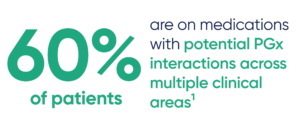
AccessDx PGx Profile
Pharmacogenomic (PGx) testing helps doctors determine the safest and most effective medications and dosages based on an individual's genetic information.
- Comprehensive multispecialty panel covering 16+ clinical specialties
- Provides actionable high-evidence drug-gene interaction insights based on CPIC, FDA, and DPWG guidance
- Ability to detect complex structural variations, enabling the identification of both common and rare ethno-specific variations – including many targets not routinely detected by other US laboratories
- Developed and validated by a team of leading PGx experts and researchers
FAQ
How do I order a test?
For healthcare providers:
If this is your first time ordering from AccessDx Laboratory, please complete our New Account Form, and we will provide cheek swab collection kits with prepaid return shipping labels.
Once your New Account Form is received, we will send you instructions for logging in to the AccessDx Provider Portal for test ordering and results review, or you can complete and return the PGx Profile Test Requisition Form included with your test kits.
For patients:
Your healthcare provider needs to order testing on your behalf. They will need to complete the steps above.
How do I request additional specimen collection kits?
If you are a current AccessDx Laboratory client, please contact our customer service team at support@accessdxlab.com and provide the number of kits requested and the address where the kits should be delivered.
If you are not a current AccessDx Laboratory client, contact connect@accessdxlab.com.
What genes are included on the AccessDx PGx Profile?
The AccessDx PGx Profile analyzes more than 120 variants across 37 genes: ABCB1, ABCG2, ACYP2, ADRA2A, ANKK1, CEP72, COMT, CYP1A2, CYP2B6, CYP2C, CYP2C19, CYP2C8, CYP2C9, CYP2D6, CYP3A4, CYP3A5, CYP4F2, DPYD, DRD2, F2, F5, FKBP5, G6PD, GRIK4, HCP5/HLA-B*57:01, HTR2A, HTR2C, IFNL4, MTHFR, NUDT15, OPRM1, SLC6A4, SLCO1B1, TPMT, UGT1A1, UGT2B15, and VKORC1.
APOE and three additional HLA tests are available upon request: HLA-A*31:01, HLA-B*15:02, and HLA-B*58:01.
Our testing covers all must-test variants and most optional ones recommended by the Association of Molecular Pathology.
For additional questions about the PGx Profile, please contact us at connect@accessdxlab.com.
How long does it take to receive AccessDx PGx Profile results?
Results are usually available 7-10 days after the sample receipt at the laboratory and will be available in the AccessDx Provider Portal.
Why should I select AccessDx Laboratory for my PGx testing needs?
AccessDx Laboratory is certified by CLIA, CAP, and NYSDOH.
The AccessDx PGx Profile was designed to:
- Adhere to PGx industry guidelines and recommendations
- Detect common or rare variants that are ethnically specific
- Identify complex variations that are difficult to detect by other laboratories
The AccessDx PGx Profile includes all must-test variants and most optional ones recommended by the Association of Molecular Pathology and we are committed to ensuring that applications of PGx in medical care reduce rather than exacerbate healthcare disparities across diverse populations.
How much does the AccessDx PGx Profile test cost?
The cost of the test varies. AccessDx offers patient pay, insurance, and institutional billing options.
For questions about billing, please contact support@accessdxlab.com.
How do I collect a specimen for the AccessDx PGx Profile?
Complete the form below to download the PDF for specimen collection instructions.
What medications are impacted by PGx?
Complete the form below to download the PDF for medications impacted by genetics.
What clinical specialities are included in the AccessDx PGx Profile?
Medications in nearly all clinical specialties have PGx indications.
The AccessDx PGx Profile contains genes and medications in the following clinical specialties:
- Anesthesiology
- Behavioral Health
- Cardiology
- Dermatology
- Endocrinology
- Gastroenterology
- Genitourinary
- Hematology
- Infectious Disease
- Neurology
- Oncology and Immunology
- Ophthalmology
- Otolaryngology
- Pain Medicine
- Rheumatology
- Transplant
What does an AccessDx PGx Profile report look like?
A sample AccessDx PGx Profile report can be provided upon request by contacting connect@accessdxlab.com.


- Ashcraft K et al. Journal of Personalized Medicine. 2022; 12(12):1972. https://doi.org/10.3390/jpm12121972
- Clockheart, D. A., Yasuda, S. U., Honig, P., Rosebraugh, C., & Woosley, R. L. (n.d.). Preventable adverse drug reactions: A focus on drug interactions. U.S. Food and Drug Administration. https://www.fda.gov/drugs/drug-interactions-labeling/preventable-adverse-drug-reactions-focus-drug-interactions.
- Watanabe JH, et al. Cost of Prescription Drug-Related Morbidity and Mortality. Ann Pharmacother. 2018;52(9):829-837.

